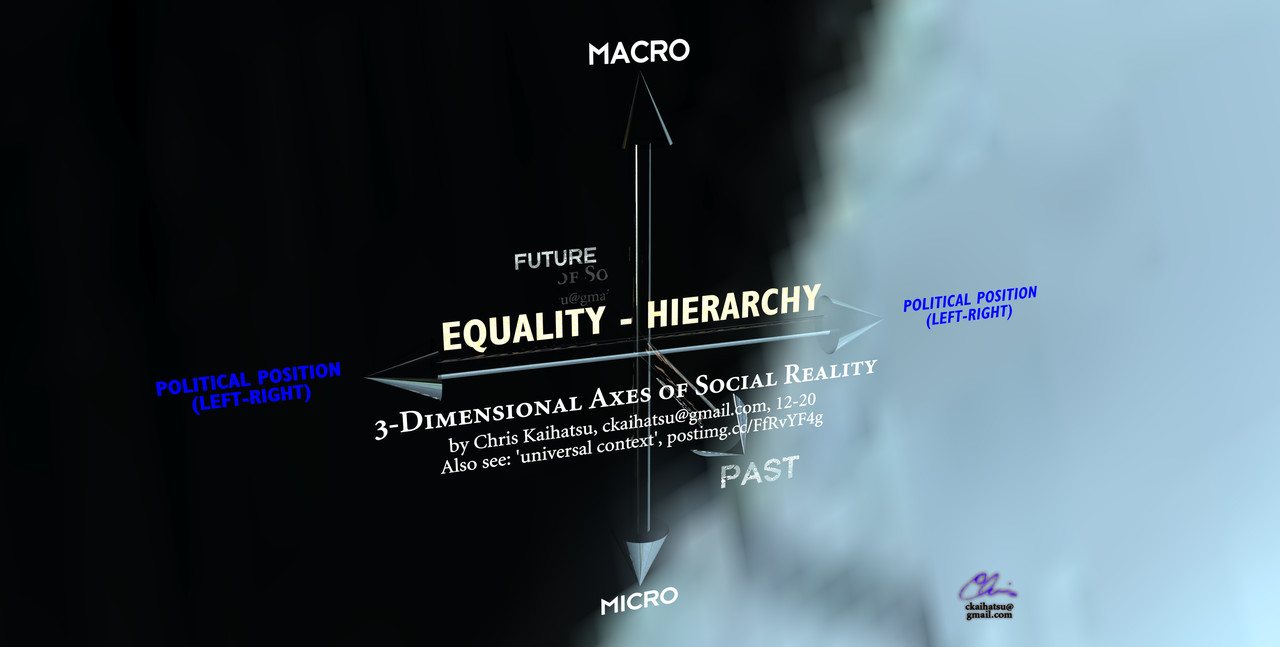Unthinking Majority wrote:
It's not my fault neoliberalism and communism sucked in practice. I don't care so much about being "centrist" or "pontificating", I care about the policies that have worked the best statistically, and the assumptions that have informed bad ideas. A lot of economic inequality means the rich get richer while letting the poor rot, meanwhile equality of outcome for everyone is against most fundamental laws of nature.
'Equality of outcomes' is an insidious *misnomer* -- fucking *no one* is calling for 'equality of outcomes', as though that's really *anyone's* professed political ideology and agenda.
By conflating political economy with *individual self-determination*, this bullshit 'equality of outcomes' formulation just serves *counterproductive* purposes, if one is genuine / serious about the issue of economic inequality.
I'll ask the reader to put these concepts side-by-side -- go ahead and *juxtapose* [1] economic equality, and [2] individual self-determination. Does the premise of societal economic equality really imply 'conformity to outcomes', as is denoted by 'equality of outcomes' -- ?
No, obviously social economic equality means that everyone gets *access* to the basics of humane modern life and living, so that they can then *self-determine* what to do, without the existence of pre-existing barriers of economic *inequality*.
Your usage of the 'outcomes' concept is a propagandistic strawman of *your own*, and is irrelevant to the *real* politics of 'economic equality', meaning the *material* world.
Unthinking Majority wrote:
I believe in roughly a balance between hierarchy and equality, though i'm probably a touch left of center economically. I'm around -4, -4 on the Political Compass test. Telling me I can only choose one or the other is just black and white thinking forcing me to be on some extreme or some false binary, when really ideology is a broad spectrum of beliefs based on fundamental philosophical assumptions of life and human nature. I don't try to be centrist, that's just what my beliefs make me.
*Or*, instead of artificially *separating* the economic from the political, many would say that the political *implies* the economic -- meaning that the two *correlate* and *don't* intrinsically vary from each other.
So if one is generally for 'equality', then that stance implies that one would be for fairness in the *economic* realm as well, and *not* for a hierarchy of income levels according to finance, or ownership, or profitability, etc.
Unthinking Majority wrote:
Doesn't mean somebody can't try out MMT, you will never discover better ways of doing things without trying out new ideas, but we also need to accept that there's a lot of risk involved due to unknowns of dramatic fundamental changes to an economy of tens of millions of livelihoods that have hardly ever been tried before. So I would say start small and gradual, and be careful. Same with any new Marxist system, find people willing to test the theories, start small and then expand. Some countries have done pilot tests of universal basic income in one city to see if/how it works, that's the right way to do it.
I have no idea if MMT will work or not, that's the whole point. I doubt it will but this again is just a theory of mine backed by little to no evidence.
'Try out' MMT -- ?
You keep reverting back to this 'clinical scientist' mindset of yours, thinking that every next step in political consciousness is some kind of fresh, creative 'newness' on the scene, that's never been thought of before, or seen, for people to "individually" try-out like some new consumer toy.
Society isn't some giant petri dish to experiment-on -- people's lives are uncomfortable and perilous *right now*, while you play-politics and light-mindedly suggest that people 'try it out'.
Yesterday I included a rundown of how Keynesianism failed to rejuvenate the capitalist economy in the U.S. in the '30s, and only *war profiteering* actually brought the U.S. empire out of its prolonged doldrums, at the expense of organized labor. Keynesianism = MMT, so why should we 'try it out' when it didn't work during the Great Depression, and hasn't worked since the times of Carter and Reagan?



















 - By skinster
- By skinster